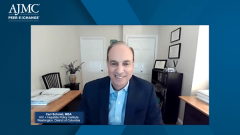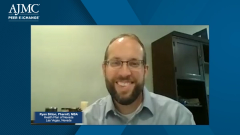
Addressing Patient Persistence and Adherence to PrEP in the Clinical Setting
Ian Frank, MD and Jeffrey Crowley, MPH address HIV PrEP adherence and persistence issues in the clinical practice setting.
Episodes in this series

Neil Minkoff, MD: Whether you define it as adherence, or persistence with therapy, and people falling off therapy, and some of you have already alluded to tactics or strategies you use to try to maximize adherence and persistence, but part of that requires maybe measuring it, understanding the root causes of it, and so on. I’d love to hear what folks are doing around measuring lack of persistence or nonadherence, and/or what is being done to try to alleviate those issues.
Ian Frank, MD: Persistence is a really complicated thing.
Neil Minkoff, MD: Hugely, yes.
Ian Frank, MD: I would say that, in general, I’m not sure practices, and I would even include my own, do an optimal job in reaching out to people who don’t keep appointments. The optimal strategy is: We’re going to schedule appointments at every 3-month intervals or a little bit sooner. People are going to come in, they’re going to have an examination, they’re going to be asked questions about their risk behaviors, whether they could have acute HIV infection, we’re going to test them for HIV, at least with an antibody test, and maybe also an RNA test. We may test them for sexually transmitted infections, we may look at renal function, and then they’re going to get another prescription, because it’s recommended that people don’t get more than 90 days [of medication]. What happens if that patient doesn’t show up after 3 months? Are we going to just wait for that person to schedule another appointment? Are we going to reach out to find out why they haven’t rescheduled an appointment? Adherence and persistence to pre-exposure prophylaxis [PrEP] are 2 different things. Adherence I define as taking your pill every day. Persistence is how long you are going to do that. Again, to get back to what I was saying before about how risk behavior changes over time, people may enter into a monogamous relationship with somebody who’s known to be HIV uninfected, or HIV infected with an undetectable viral load. Maybe that person doesn’t need to be on PrEP for a period of time. Thus, falling out of PrEP care is not inappropriate. The question is: Do practices reach out to try to find out whether somebody has appropriately left PrEP care, or is somebody just not following through? I think we need to do a better job at the follow-through to figure out whether we need to be a little bit more proactive in bringing people back into the practice.
Jeffrey Crowley, MPH: For the clinicians, I would want to say that for people with HIV, it’s really important that we emphasize adherence to daily pill-taking. But with PrEP, it is more forgivable than with other agents. In France, for example, they have an intermittent PrEP model. Dr. Frank can correct me, but I think most of the studies say if you take at least 4 pills in a week, so 4 out of 7 days, you’ll have a reasonably high level of protection. Thus, even though we want to understand why people wouldn’t take a pill every day and what the factors are and address those, unlike treatment, there is more room for error.
Transcript edited for clarity.
Newsletter
Stay ahead of policy, cost, and value—subscribe to AJMC for expert insights at the intersection of clinical care and health economics.











